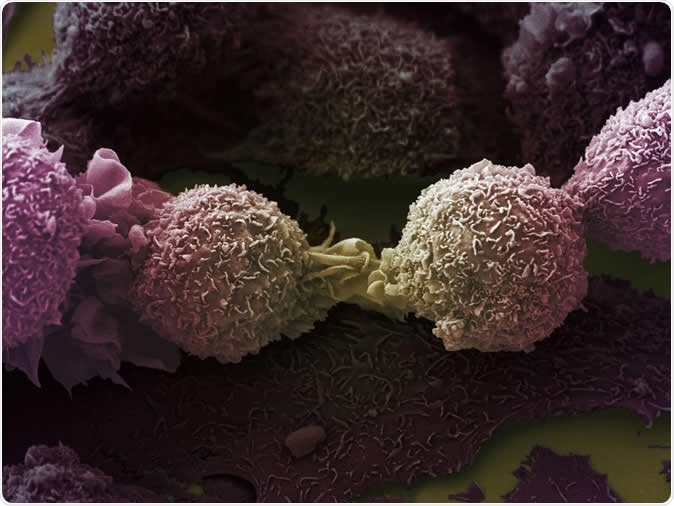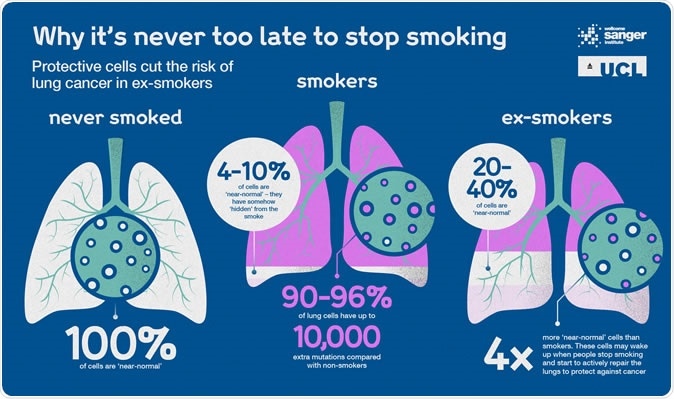A new study could explain how lung cancer risk is reduced by quitting smoking. Published in the journal Nature in January 2020, the study shows that ex-smokers have a greater number of lung cells that have healthy genes compared to current smokers. Healthy genes are less likely to transform into cancerous cells.
About 47,000 people die of lung cancer each year in the UK, making it the leading cause of death due to malignancy in the UK. Lung cancer is responsible for more than one in five cancer deaths. However, over 70% of lung cancer deaths in the UK are due to the deadly practice of tobacco smoking. The US will see almost 230,000 new lung cancer cases in 2020, according to one estimate.
Tobacco smoking causes damage to the DNA within lung cells. One outcome of such damage is the production of flawed genetic sequences. A particularly dangerous result of such a error-stimulating process is the production of “driver mutations”, a change in the genetic sequence which allows the cell to grow more than a normal cell would. As more and more driver mutations build up within the lung cells, the cell cycle becomes one of sustained unregulated growth, causing a cancer to develop.
However, quitting smoking produces a dramatic reduction in cancer risk. How this happens was a major focus of this study. The study is one of several that make up the Mutagraphs of Cancer project, funded by the Cancer Research UK as part of the Grand Challenge. The mutagraphs project is looking at how DNA profiles can show where and how genetic damage occurs in smoking, which will help to understand what causes cancer. It may even show up some causes that are currently unknown.

Electron microscopy image of lung cancer cells. Image Credit: LRI EM Unit
The study
In the current study, researchers examined lung tissue taken from 16 people, some of whom were smokers, others ex-smokers, and still others non-smokers or children. The aim was to delineate how smoking affected the genes of normal healthy lung cells. Altogether, the study involved over 630 cells, the DNA of which was extracted and analyzed.
The scientists found that even in non-cancerous lung cells in smokers, over 90% showed up to 10,000 unwanted errors or mutations in the genome, all of which were due solely to the toxic effect of chemicals in cigarette smoke. Over 25% of these mutated cells had one or more cancer-driver mutations, leading directly to the high risk of lung cancer in these individuals.
Study author Kate Gowers explains, “We found that even these healthy lung cells from smokers contained thousands of genetic mutations. These can be thought of as mini time-bombs waiting for the next hit that causes them to progress to cancer. Further research with larger numbers of people is needed to understand how cancer develops from these damaged lung cells.”

The lungs of ex-smokers contained up to four times as many genetically healthy cells than those of current smokers. Image Credit: The Sanger Institute / UCL
The survivor-saviors
And yet, in cells from ex-smokers, the airway epithelium also showed large clusters of healthy cells without smoking-related genetic damage. These cells were just as healthy as those from non-smokers and indicated a low risk of lung cancer. And once the person quit, they were beginning to repair the airway lining that had been damaged by smoking.
Unexpectedly, there were four times as many of these healthy cells in ex-smokers than in current smokers. In fact, these cells made up about 40% of all lung cells in smokers who had quit.
The current research shows the useful outcomes of stopping cigarette smoking. For one, it prevents further lung damage. However, it goes beyond that. It allows the airway lining to be renewed by the active proliferation of new healthy cells. Thus, the balance between sick or damaged cells and healthy cells shifts in favor of the latter, leading to a net protective effect that could help prevent lung cancer. This strongly supports the benefits of quitting smoking, whatever the smoker’s age, to allow these beneficial effects to take place.
Public health implications
Researcher Peter Campbell explains: “People who have smoked heavily for 30, 40 or more years often say to me that it's too late to stop smoking - the damage is already done. What is so exciting about our study is that it shows that it's never too late to quit - some of the people in our study had smoked more than 15,000 packs of cigarettes over their life, but within a few years of quitting many of the cells lining their airways showed no evidence of damage from tobacco.”
On the other hand, there are other features of smoking-induced damage that impair the elastic recoil of the lung tissue. The normal elastic nature of lung tissue helps to push out air with each exhalation, and damage to the elastic tissue can cause chronic obstructive lung disease such as emphysema. This cannot be reversed even after quitting, unlike the genetic changes.
Overall, the researchers say it is worth stopping smoking to reduce lung cancer risk, whatever the age. Quitting both prevents further damage to the lung cell genome, and stimulates undamaged cells to replace the mutated ones, protecting the lungs against cancer. Cancer Research UK’s Rachel Orritt explains, “It's a really motivating idea that people who stop smoking might reap the benefits twice over - by preventing more tobacco-related damage to lung cells, and by giving their lungs the chance to balance out some of the existing damage with healthier cells. What's needed now are larger studies that look at cell changes in the same people over time to confirm these findings.
"The results add to existing evidence that, if you smoke, stopping completely is the best thing you can do for your health. It's not always easy to kick the habit, but getting support from a free, local Stop Smoking Service roughly triples the chance of success compared to going it alone."
Journal reference:
Yoshida, K., Gowers, K.H.C., Lee-Six, H. et al. Tobacco smoking and somatic mutations in human bronchial epithelium. Nature (2020). https://doi.org/10.1038/s41586-020-1961-1